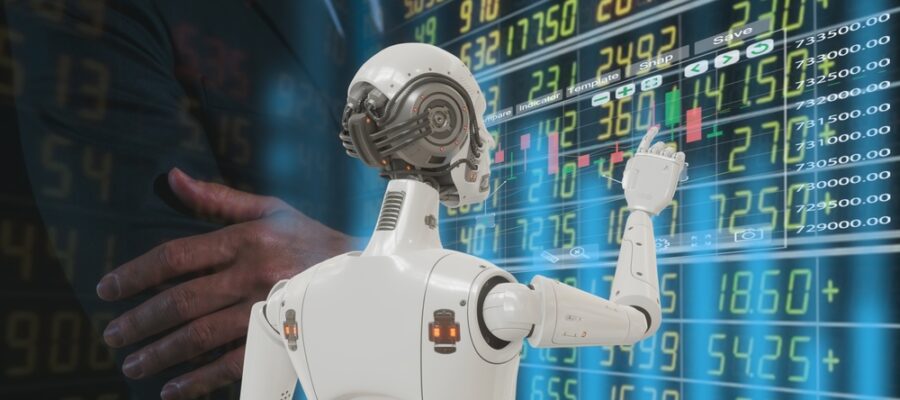AI bots in Blockchain Transactions
Bots are some of the earliest artificial intelligence (AI) tools utilized on blockchains. In the past, they scanned order books, executed trades, and tracked price shifts without human intervention.
Etherdelta was an early decentralized exchange (DEX) on Ethereum and presented the infrastructure for AI bots. Bots were programmed to identify arbitrage opportunities or jump on price alterations before anyone could.
Despite lacking sophistication in the earlier days, they executed their tasks. This was the initial indication of AI’s capability to enhance blockchain transactions.
AI-Enhanced Projects
The bot’s sophistication advanced as AI technology advanced to become multi-functional systems capable of handling intricate, multi-step processes. Examples of initiates where artificial intelligence is vital in blockchain transactions include:
- Numeral: This project runs Erasure and permits data scientists to utilize AI models to forecast shifts in stock markets. The AI models drive the decision-making processes, and transactions are implemented on the blockchain based on AI’s estimates.
- Fetch.ai: It utilizes independent AI agents that act on behalf of users to perform real-time transactions. The bots run autonomously, interacting with other agents to get things done more effectively.
Besides being theoretical, the projects have experienced steady growth in transaction volumes and user adoption. For instance, Fetch.ai’s autonomous agents are increasingly incorporated into sectors beyond finance, for instance, supply chain management and transportation.
AI bots Interacting With Other AI Bots
The interaction of AI bots with each other is no longer theoretical. Coinbase, a major crypto exchange, attained a breakthrough in combining artificial intelligence and blockchain technology.
In the pioneering moment, the firm’s chief executive officer oversaw the initial crypto transactions wholly managed by AI bots. This illustrated AI’s changing capabilities in executing and automating blockchain transactions without human intervention.
The breakthrough highlights AI’s changing capabilities in executing and managing blockchain transactions independently. In this transaction, one AI agent utilized crypto tokens to interact with another agent and obtain AI tokens.
The CEO noted that AI agents lack conventional transaction capabilities like bank accounts. However, they can use crypto wallets on the Base platform to execute global, prompt, and cost-free transactions with traders, other AI agents, and humans.
AI Risks and Challenges on Blockchains
Despite AI solutions being robust, they have challenges. Examples include:
- Transparency: Most AI bots utilize proprietary algorithms, which leaves users with little understanding of how decisions are made. In regulated sectors, regulators need ‘explainability’ for AI-enhanced decisions.
- Frontrunning: It happens when a bot spots a pending transaction and places its transaction ahead of it to leverage price changes. It is a common problem on Ethereum, where gas fees determine price order.
- Volatility sensitivity: Despite being efficient and quick, AI bots are susceptible to market changes. In highly unstable market conditions, they can execute trades that result in significant losses, especially in decentralized finance markets where quick price changes are prevalent.
- Security susceptibilities: Blockchain platforms have encountered exploits like flash loan attacks, showing that even the most advanced systems can be compromised, leading to considerable financial losses.
How AI Benefits Blockchain Ecosystems
In spite of the risks, the benefits of utilizing AI for blockchain transactions are vivid. AI bots ensure excellent efficacy, executing tasks in milliseconds compared to humans.
Automating repetitive tasks like liquidity management and arbitrage ensures resource allocation to more intricate decision-making processes. In decentralized finance, AI enhances liquidity by dynamically changing positions based on real-time market information.
AI-enhanced agents can independently handle tasks such as optimizing supply chain operations and minimizing human involvement and costs while boosting overall efficacy as well as transaction speed.
The Future of AI in Blockchain
The role of AI in blockchain will continue growing. The early adoption stage is changing into something bigger.
As AI-enhanced bots become more intelligent, people should expect more intricate transactions, for instance, cross-chain trading and real-time liquidity optimization across several platforms. With AI facilitating increasingly secure and efficient transactions, blockchain systems may witness a surge in scalability and user adoption.
All trademarks, logos, and images displayed on this site belong to their respective owners and have been utilized under the Fair Use Act. The materials on this site should not be interpreted as financial advice. When we incorporate content from other sites, we ensure each author receives proper attribution by providing a link to the original content. This site might maintain financial affiliations with a selection of the brands and firms mentioned herein. As a result, we may receive compensation if our readers opt to click on these links within our content and subsequently register for the products or services on offer. However, we neither represent nor endorse these services, brands, or companies. Therefore, any disputes that may arise with the mentioned brands or companies need to be directly addressed with the respective parties involved. We urge our readers to exercise their own judgement when clicking on links within our content and ultimately signing up for any products or services. The responsibility lies solely with them. Please read our full disclaimer and terms of use policy here.

